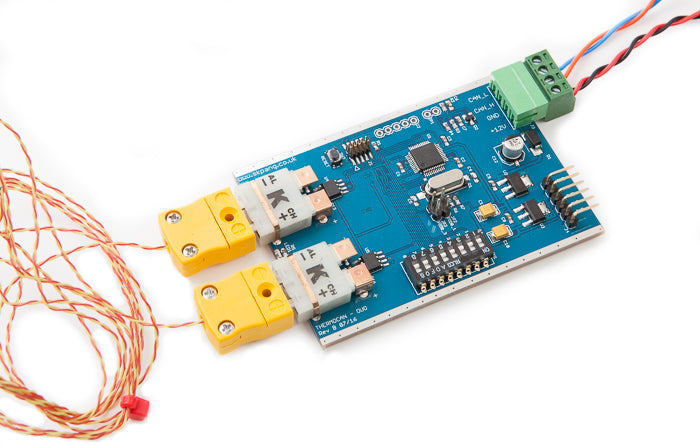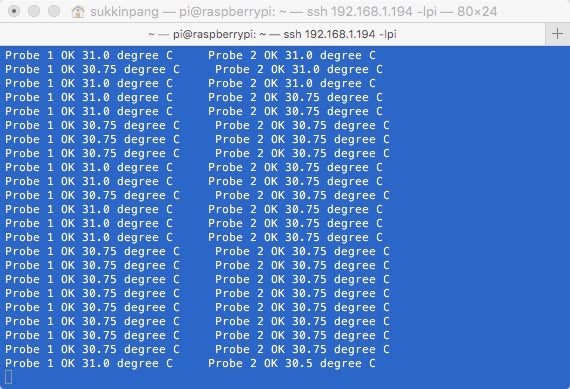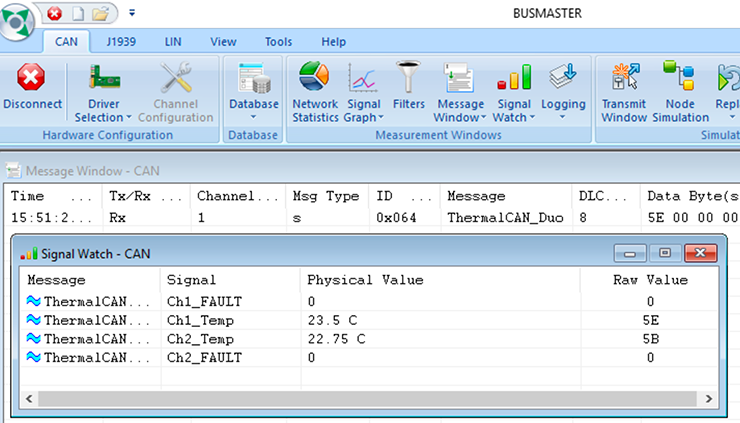Dieses Board bietet eine Zweikanal-CAN-Bus-Schnittstelle für Thermoelemente vom Typ K. Es kann eine Temperatur von -270 bis +1250 oC lesen, je nach verwendetem Fühler. Die CAN-ID kann mit den DIP-Schaltern auf der Karte konfiguriert werden und die Abtastrate kann mit einem Intervall von 0,5 oder 1 Sekunde eingestellt werden.
Merkmale
- Zwei Kanal-Thermoelement-Eingänge vom Typ K
- -270 bis +1250 ºC Eingangsbereich (fühlerabhängig)
- 0,25 ºC Auflösung
- 0,5 oder 1 Sekunde Abtastrate
- 6 V bis 16 V Eingangsspannungsbereich
- Schutz gegen Verpolung der Spannung
- Wählbare CAN-Baudrate über Dip-Schalter. 125, 500, 1000kbps
- Wählbare CAN-ID über Dip-Schalter
- UART-Ausgang
- SWD/JTAG-Header
- LED-Anzeige
Dokumente
- Schaltplan
- Benutzerhandbuch
- Python-Beispiel zur Verwendung mit PiCAN2 auf Raspberry Pi
- DBC-Datei
- DBF-Datei für die Verwendung mit Busmaster von Bosch
Thermoelementfühler sind nicht enthalten. Wir haben aber das Thermoelement Typ-K Glasgeflecht isoliert - K von Adafruit in unserem Shop.
English Description
This board provides a two channel CAN-Bus thermocouple K-type interface. It can read a temperature from -270 to +1250 oC depending on probe used. The CAN ID can be configured with the on board DIP switches and sample rate can be configure at 0.5 or 1 second interval.
Features
- Two channel K-type thermocouple inputs
- -270 to +1250 ºC input range (probe dependent)
- 0.25 ºC resolution
- 0.5 or 1 second sample rate
- 6v to 16v input voltage range
- Reverse voltage polarity protection
- Selectable CAN baudrate via dip switches. 125, 500, 1000kbps
- Selectable CAN ID via dip switches
- UART output
- SWD/JTAG header
- LED indicator
Documents
- Schematic
- User guide
- Python example for use with PiCAN2 on Raspberry Pi
- DBC file
- DBF file for use with Busmaster from Bosch
Thermocouple probes not included. But we have the Thermocouple Type-K Glass Braid Insulated - K from Adafruit in our shop.
GPSR - EU Verantwortliche Person: Maximilian Batz, pi3g GmbH & Co. KG, Zschochersche Allee 1, 04207 Leipzig, Deutschland, support [@] pi3g.com
GPSR - Produkthersteller (Kontaktdaten für GPSR): SK Pang Electronics Ltd, PO BOX 10956, Harlow, Essex, CM20 9JG, Vereinigtes Königreich, +44 20 3286 6988
GPSR - Wirtschaftsakteur: Miximilian Batz, pi3g GmbH & Co. KG, Zschochersche Allee 1, 04207 Leipzig, Deutschland, support [@] pi3g.com
Sicherheitsangaben
- Lesen Sie die Bedienungsanleitung sorgfältig durch, bevor Sie das Produkt verwenden.
- Stellen Sie sicher, dass alle Montage- und Installationsanweisungen des Herstellers sorgfältig befolgt werden.
- Verwenden Sie das Produkt nur für den vorgesehenen Zweck.
- Die unsachgemäße Nutzung dieses Produkts kann zu schweren Verletzungen oder Sachschäden führen.
- Nicht für Kinder unter 10 Jahren geeignet.
- Bei unsachgemäßer Verwendung besteht eine Verletzungsgefahr.
- Dieses Produkt entspricht den geltenden Sicherheitsanforderungen der Europäischen Union.
- Dieses Produkt wurde gemäß der GPSR geprüft, die sicherstellt, dass alle relevanten Sicherheitsanforderungen für Konsumgüter eingehalten werden.
Nachverfolgbarkeitsinformationen
Jedes Produkt verfügt über eines oder mehrere der folgenden Merkmale:
- Ein CE-Kennzeichen, das die Einhaltung der Sicherheits-, Gesundheits- und Umweltschutzanforderungen der Europäischen Union anzeigt.
- Eine eindeutige Serien- oder Chargennummer, um die Nachverfolgbarkeit zu gewährleisten und bei Bedarf Rückrufaktionen zu unterstützen.
- Hersteller- und Importeurangaben für den Kundensupport und Sicherheitsanfragen.
Überwachung und Berichterstattung von Vorfällen
Für den unwahrscheinlichen Fall eines Produktproblems haben wir Verfahren implementiert, um:
- Kundenbeschwerden zeitnah bearbeiten.
- Schwerwiegende Vorfälle über das EU Safety Gate/RAPEX-System melden.
- Mit den Marktüberwachungsbehörden zusammenarbeiten, um die öffentliche Sicherheit zu gewährleisten.
Kontakt:
- Email: support [@] pi3g.com
- Telefon: 0341 / 392 858 40
Dieses Produkt ist vollständig mit allen geltenden EU-Vorschriften konform, um die Sicherheit unserer geschätzten Kunden zu gewährleisten.



